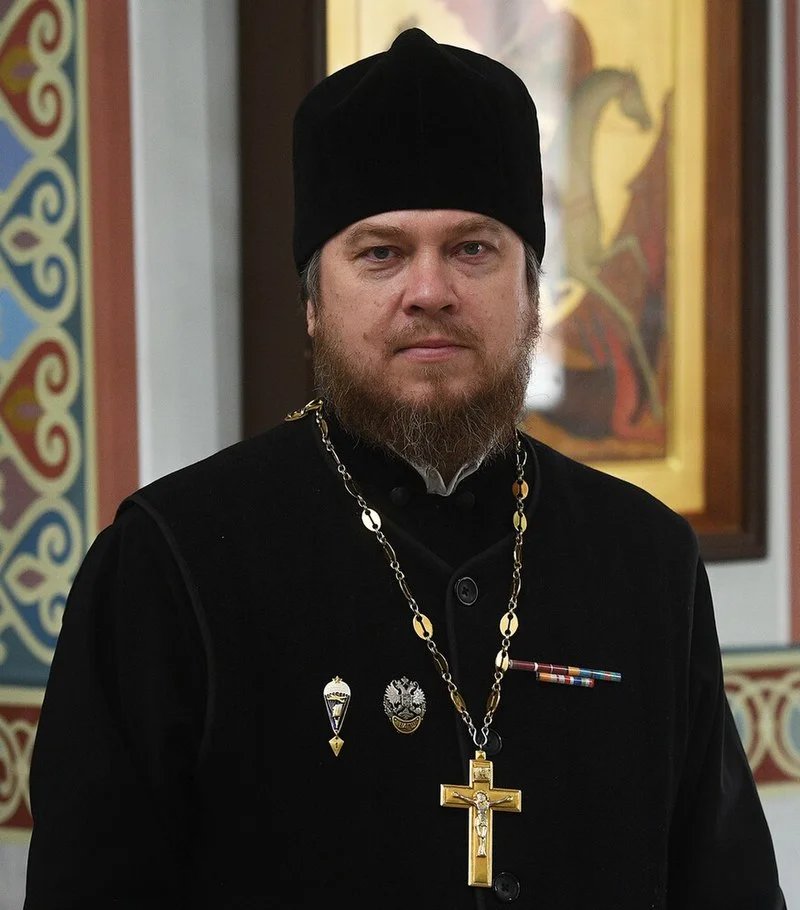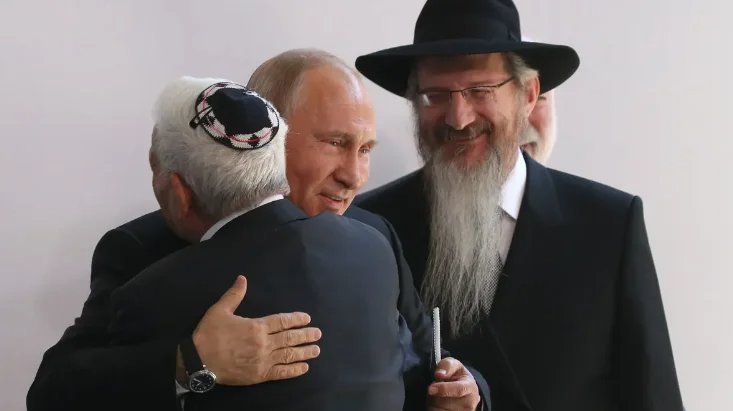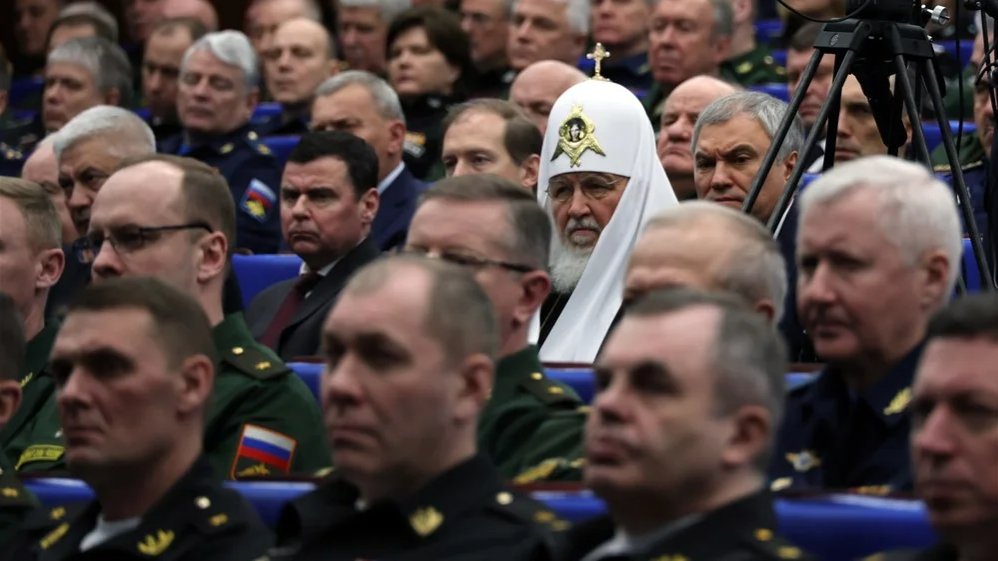Before 2022, the Western Christian world drew its inspiration from “theology after Auschwitz”, attempting to explain how the thousand-year-old roots of Christian civilisation grew into Nazi concentration camps and the Holocaust. The Orthodox Christian tradition had lacked its own experience in trying to understand why the “God-bearer people” had once destroyed churches in the thousands and killed millions of their own.
This tradition crossed its Rubicon with Bucha, Irpin, Izium, and hundreds of other Ukrainian cities and villages where, this year, churches were destroyed and people killed — most of whom had identified as Orthodox. Even if this war does not spell the end of the Orthodox Christian civilisation, it will leave a deep rift in it. The outlines of this rift became visible as Ecumenical Patriarch Bartholomew pointed out similarities between the Third Rome’s (Moscow’s — translator’s note) “messianism” and the Third Reich’s ideology and accused his former Moscow brethren of laying the conceptual foundation for the current aggression.
No heaven for the peacemakers?
The modern-day Moscow Patriarchate is the result of a “concordat” that Joseph Stalin established on 4 September 1943 with three Communist-affiliated bishops — Sergius, Alexius, and Nicholas.
In its early years, the newly established Patriarchate dutifully praised the “God-given leader”, later becoming a tool of the Soviet Union’s “peaceful foreign policy” as it found religious justification for the totalitarian ideology of Communism. With this historical baggage, the Church entered the Putin era, which found its apogee in 2022.
While the previous Patriarch, Alexy II, who became the head of the Russian Orthodox Church during the perestroika, allowed himself a morsel of autonomy, protesting against the First Chechen War, the incumbent Patriarch Kirill is never even a hairsbreadth away from the party line. This autumn, Kirill expounded Putin’s assertion that Russians who die in the war will “go to Heaven”, claiming that a death on the front line “washes away all the sins that a person has committed”. This is the shortest path to Heaven. Not keeping the Holy Commandments, not prayer and fasting, not deeds of charity…
The other point of view, which stems from the scriptural “Blessed are the peacemakers”, is now hardly ever heard within the Russian Orthodox Church. In the very first days of the war, several ROC clerics published an open letter demanding a ceasefire and reconciliation. It gathered 280 signatures of priests and deacons, many of whom live outside of Russia. Some of them were subsequently suspended from performing religious rites, while others suffered persecution from the Russian judiciary system.
Among the “alternative” Russian Orthodox churches only the Russian Orthodox Church outside of Russia (of the Agathangel schism) has taken an explicitly anti-war position.
Criminal cases have been launched against its clerics: for instance, priest Ioann Kurmoyarov, who moved from Ukraine to Russia and is currently under arrest, faces up to ten years in prison.
This year also saw Russian courts deal out sentences for protest signs with Bible quotes (e.g. “Thou shalt not kill”) deemed do discredit the Russian Armed Forces.
The horsemen of the Apocalypse
The initial slogans of the “special military operation”, shapeless and intangible as they were, were gradually abandoned. The “denazification” and “demilitarisation” of Ukraine gave way to its “desatanisation” — exactly the “Moscow messianism” that Patriarch Bartholomew had spoken of.
On National Unity Day held on 4 November, former president Medvedev urged, on behalf of the Kremlin, to “stop the High Lord of Hell” in the battlefield.
Conspiracy theorists state that Satan, Lord of Hell, acts through his secret servants who are present either in a mysterious world government or in Masonic establishments. Patriarch Kirill has hinted at them in one of his sermons dedicated to the reinterpreting of the “special military operation”. He called for Russia to be saved from “the most powerful forces that nowadays govern most countries in the world”. Within this theory, warfare becomes sanctified through an increase in the number of casualties.
The main promulgator of this idea of a nation-wide sacrifice is Alexander Dugin, an “Orthodox Christian” Eurasianist with ties to the Kremlin and the Church. Dugin’s logic is infernal, but it is in perfect harmony with the logic of the “special military operation” — as senseless as it is cruel.
“With our dead, we are making a hole in an impregnable wall,” Dugin asserts. “When we are done, such sweet, such pure light will pour in through the breach that… all will be resurrected.” Coercing Christ into a Second Coming?
Theology of war

Archpriest Mikhail Vasilyev
In contrast to their speeches of sacrificial passion, the presence of the Russian Orthodox Church among the fighting troops seems very meagre. According to Father Superior Kirill, spiritual advisor to the Union of Orthodox Brotherhoods, only five priests have visited the front on the Russian side since the war began. Most of them did not return.
The most publicised death was that of archpriest Mikhail Vasilyev, rector of a church serving Russia’s Strategic Missile Forces, who died on the outskirts of Kherson in early November. Only a few days earlier, he gave a speech on the Orthodox TV channel “Spas”, calling on Russian mothers to be more active in sending their sons to the “special operation”.
An exemplary preacher of “war theology” is archpriest Igor Fomin, rector of the church serving MGIMO University. Together with “Spas” CEO Boris Korchevnikov, Fomin has created a five-episode propagandist film “War and the Bible”.
The work’s core idea is a return to the Old Testament, or rather to the time when the Jewish people were conquering the Promised Land, eradicating the tribes that lived there.
“Go forth and slaughter, extinguish the people”, exclaim the film’s creators. They are convinced that “serving God” today means killing Ukrainians. One of Jesus’ prophecies inevitably comes to mind: “The time cometh, that whosoever killeth you will think that he doeth God service” (John 16:2).
“We will hold President Putin and those responsible to account in accordance with international law”, the G7 leaders promised on the 12 December. Seeing as, for the first time in history, the West has imposed sanctions on several ROC clerics, including the Patriarch himself, the future tribunal will no doubt also cast its attention on religious organisations and clerics involved in war propaganda.
Denominations on opposite sides
The ROC is not alone in its warmongering. The “special military operation” earned unwavering support from the head of the Russian Orthodox Old-Rite Church Korniliy (Titov), costing him his Ukrainian and Romanian dioceses.
Another branch of Old Believers, the Russian Old-Orthodox Church, opted for a more calculated position, choosing to remain silent. The Muslim and Buddhist leaders in Russia explicitly took Putin’s side, while the Jews, including the chairman of the Federation of Jewish Communities in Russia Berel Lazar, speak out against military escalation.
Head of the Rabbinical Court of Russia and the CIS Pinchas Goldschmidt had to move to Israel due to his anti-war stance. Russian Baptists and Catholics have also issued demands to stop the hostilities and the capture of foreign territories.

Vladimir Putin and Berl Lazar (right). Photo: Mikhail Svetlov / Getty Images
Shortly before Christmas, a group of Orthodox, Catholic, and Protestant clerics and activists from Russia published an anti-war declaration calling on religious authorities (predominantly the ROC) not to ignore God’s commandments about nonviolence and renouncing vengeance.
“Participation in this war on the side of the aggressor is unacceptable for any Christians”, the declaration says. “We disagree with the notion that patriotism means blind loyalty and love to the state and its ruler… But seek first the kingdom of God and his righteousness, and all these things will be added to you» (Matthew 6:33)… The ‘neighbour’ for us Russian Christians is the suffering people of Ukraine.”
“Depatriarchisation” of Ukraine
In his “history lecture” on 21 February, Vladimir Putin said he intended to defend the Ukrainian Orthodox Church of the Moscow Patriarchate (UOC-MP). Three months later, on 27 May, the council of the UOC-MP in Kyiv strongly condemned Russia’s actions and distanced itself from the Moscow Patriarchate. There is now not a single parish on Ukraine-controlled territories that is subject directly to the Moscow Patriarchate — which in its turn has non-canonically subjugated parishes in the Crimea and (partly) in the Donbas region.
As early as the 24 February, UOC-MP primate Metropolitan Onuphrius (Berezovsky) condemned the invasion, comparing it to the sin of the Biblical Cain who had killed his brother Abel.
On the 27 February, Onuphrius asked Kirill to intercede with Putin on behalf of the persecuted Ukrainian people and their holy relics. He then ceased his participation in the Synod of the Russian Orthodox Church. “Innocent civilians are dying, children are dying. In occupied towns, women are being raped, people’s property is being taken away and destroyed, civilians are being tortured and killed”, Onuphrius wrote to the Moscow Patriarch. “Since the first days of the war, people have been sheltering in the churches that have remained intact or been partly destroyed.”
Seeing the patriarch’s position, Ukrainian parishes one by one stopped mentioning him in their services, which had Kirill threatening Ukrainian bishops with punishment not only in the afterlife but in this one.
This punishment can even be measured: at least 109 Ukrainian monasteries and churches have been severely damaged in the past ten months, the New York Times writes. Among them is the Sviatohirsk Lavra monastery in the Donetsk region, which was on the front line for several months. Its buildings received heavy damage, and several priests and monks were killed.
The “Russian world” has also left a deep internal wound in Ukrainian Orthodox Christianity. The spring months saw the first arrests of UOC-MP clerics who had served as spotters or sabotage operatives for the Russian military. “Creative” propaganda of the “Russian world” concept in the Kyiv-Pechersk Lavra, the center of Ukrainian Orthodox Christianity, led to a wave of searches on UOC-MP property in November, conducted by the Security Service of Ukraine. UOC-MP parishes started actively changing over to the autocephalous Orthodox Church of Ukraine, which has no ties to Moscow whatsoever, while the Ukrainian parliament is discussing bills that would ban the Moscow Patriarchate from the country altogether.
The Russian Orthodox Church has entered into a hybrid relationship with its former Ukrainian branch. In June, Patriarch Kirill created a commission that was supposed to prepare the “excommunication” of all Ukrainian parishes, but later he changed his position to a more moderate one. The ROC has put off its Bishops’ Council (which is not legitimate without the participation of Ukrainian bishops) four times already, going against its own charter that states the Council must convene every four years.
Now, several of the Church’s higher governing bodies are formally acting beyond their authority since their term of office has expired, while only the Council can renew them. The issue of the next Council convocation will not be raised until the end of the “special military operation”, sources in the Moscow Patriarchate say.
Worldwide Christianity against the ROC
The UOC-MP is the biggest loss of the Moscow Patriarchate this year, but pretty much everybody is distancing themselves from the war-supporting Russian Orthodox Church. Back in May, seeing the moral and political powerlessness of Patriarch Kirill, Ecumenical Patriarch Bartholomew called on him to leave his post so as not to tarnish the once good name of Russian Orthodox Christianity.
Attempts to justify Russian aggression have been condemned by Christian Orthodox churches in Finland, Bulgaria, Romania, Poland, Georgia, and America, as well as Protestant leaders headed by the Archbishop of Canterbury and the World Council of Churches.
This is a level of international isolation that surpasses even what the ROC had experienced in the late 1930s.
Given this ecumenical unanimity, Pope Francis’ position raises certain questions. The Pontiff chose the launch of negotiations between Russia, Ukraine, and the EU as his main objective for 2022. To lay the ground for them, he intended to visit Moscow and Kyiv (in this order). The visit was planned for May, then for June, then for August, before being cancelled altogether.
Going against protocol, the Pope personally visited the Russian Embassy at the Holy See and later continuously confessed his love for the Russian people. Most scandalous within this context became the following words, spoken in an interview to a Jesuit magazine: “The cruellest [in the war — editor’s note] are perhaps those who are of Russia but are not of the Russian tradition, such as the Chechens, the Buryats and so on”.
The Vatican later apologised for these words, but they go together with Francis’ other statements on the topic of Russia. He had claimed that NATO was “barking at Russia’s gate” and that supplying Ukraine with arms would only lead to escalation and increase the number of casualties. At the same time, the Pope authored the ecclesiastic meme of the year, naming Patriarch Kirill “Putin’s altar boy”…
Beating Ukraine to it, Latvia became the first country in the world to outlaw the ROC. In September, its parliament passed a law forcing the Latvian Orthodox Church to leave the Moscow Patriarchate. After some faltering, Kirill’s position was also condemned by his Estonian proxy, Metropolitan Eugene (Reshetnikov).
A more controversial situation arose in Lithuania, where head of the local ROC diocese Metropolitan Innocent (Vasilyev) first “strongly condemned” Russia’s actions and then punished priests for speaking out against the war. As a result, Lithuania, which was historically part of the Kyiv Metropoly of the Constantinople Patriarchate, stands before a possible schism that would divide it into two jurisdictions — Constantinople and Moscow.
Priest Ioann Burdin, who was fined for calls to peace during a sermon in a village church, in the Russian North believes the events of 2022 to be the result of a large-scale demonic possession that the people of Russia have already proven themselves capable of during certain episodes in 20th century history. A sure sign of possession is the sanctification of obvious sin, when executions of civilians, “plunder and capture of others’ territories are proclaimed to be holy war”.
Christianity worldwide is dumbfounded: it didn’t expect the “largest Orthodox country” to return to the doctrine of “Holy War”, devoid of both profit and rationality, “750 years since the last crusade”. “Everybody will suffer damnation for this. Not only those who gave the order, but everyone who agreed or said nothing” — a simple truth from the lips of a village priest that cannot be spoken by his patriarch.
Join us in rebuilding Novaya Gazeta Europe
The Russian government has banned independent media. We were forced to leave our country in order to keep doing our job, telling our readers about what is going on Russia, Ukraine and Europe.
We will continue fighting against warfare and dictatorship. We believe that freedom of speech is the most efficient antidote against tyranny. Support us financially to help us fight for peace and freedom.
By clicking the Support button, you agree to the processing of your personal data.
To cancel a regular donation, please write to [email protected]

